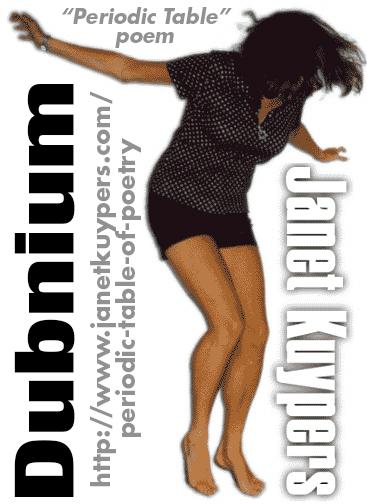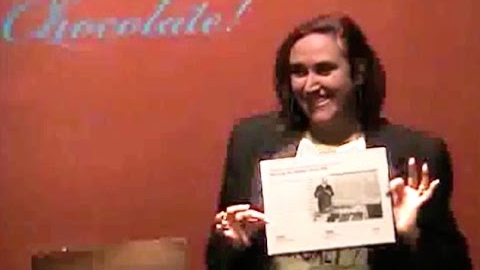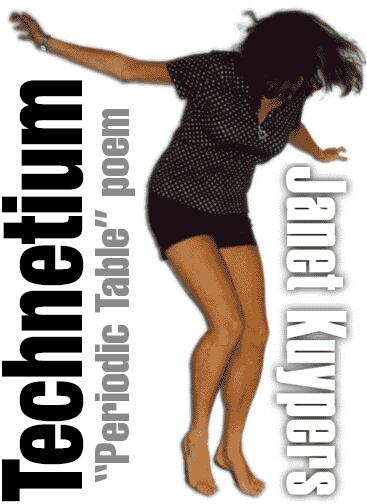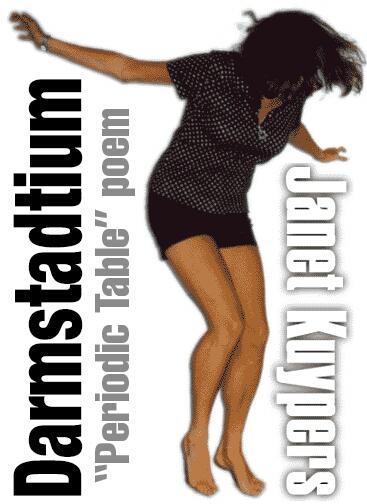Dubnium
Janet Kuypers

from the “Periodic Table of Poetry” series (#105, Db)
(8͏23͏14)
Over the years, the U.S. and Russia
have fought over all sorts of things —
thermo-nuclear bombs,
inter-continental ballistic missiles
to carry those bombs,
even getting men into space,
or winning the most Olympic medals,
or even… Making new chemical elements.
You may think of the Cold War
when I mention the U.S. and Russia,
oh, I’m sorry, the Soviet Union,
but you could probably also think
of the Transfermium Wars
where both countries spilled a lot of
ink
in an effort to come out the winner.
Because it was both Dubna in the USSR
and Berkeley California in the U.S.A.
that claimed the discovery of this element,
but after the Cold War, the IUPAC
(oh, don’t make me spell that out for you,
the International Union of Pure
and Applied Chemistry, the group
that decides the names for elements)
said that credit for this discovery
should be shared between the two.
But if the two countries no longer
battled over who discovered it first,
they could at least then argue
over the naming rights for the element…
The Soviets wanted to call it nielsbohrium
for the Danish nuclear physicist Niels Bohr.
The Americans wanted to call it hahnium
for the late German chemist Otto Hahn.
SO, American and Western Europeans
started calling the element hahnium,
while the Soviet Union and Eastern Bloc
countries went on calling it nielsbohrium.
So the IUPAC gave the name unnilpentium
(one zero five, Unp) as a temporary name.
Though the two countries still disagreed
over the naming of this new element,
The IUPAC then decided on Dubnium,
to honor the Russian discovery location.
I think the only reason it got to be named
after Dubna is because America had
so many elements already named for them
(like berkelium, californium, americium),
and if the elements AROUND one oh five
(rutherfordium and seaborgium) are U.S.,
Dubnium can offset the American discoveries.
So yeah, even after all these decades
of competition and mistrust,
a third party had to come in — repeatedly —
to try to settle our squabbles,
kind of like the UN…
But now that we’re got the name
figured out for element one oh five,
maybe now we can learn about Dubnium,
right?
So I did a little research, and lo and behold,
scientists haven’t been able to figure
this element out either.
Melting point? Unknown.
Boiling point? Unknown.
Density? Unknown…
I guess that’s what we get
for battling with the Soviet Union
(well, okay, later Russia)
to try to create a highly radioactive metal
which doesn’t even occur in nature.
Only a few atoms have ever been made,
so I guess our “creation”
is for research interest only.
…But wait a minute, we just created
a radioactive element — should we worry
that if this spreads we’ll turn
into a radioactive planet?
Will our progenitors
be a radioactive species?
Well, that might sound like a thrill
for comic book guy, but Dubnium
is so unstable that it would decompose
so quickly that it’ll never affect humans.
And because of Dubnium’s half life
of half a minute (that’s short, by the way),
there’s no point in even worrying
about it’s affects on the environment either.
So as I said, sorry comic book guy,
but this won’t turn us
into radioactive people
or kill us by radiation…
Hmmm, maybe the United States
and Russia once worked
on trying to blow each other up
with nuclear bombs and missiles,
but when it came to the Dubnium battles
in the Transfermium Wars, maybe for once
we were both working at the same time
on something for science
that will only help us learn.




